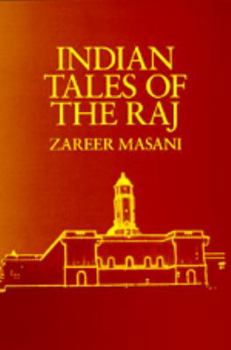Indian Tales of the Raj
Select Format
Select Condition 
Book Overview
As rich and varied as India itself, these accounts bring to the reader the Indian perspective on the British Raj. Included are the memories and experiences of more than fifty Indian men and women who... This description may be from another edition of this product.
Format:Paperback
Language:English
ISBN:0520071271
ISBN13:9780520071278
Release Date:November 1990
Publisher:University of California Press
Length:172 Pages
Weight:0.55 lbs.
Dimensions:0.5" x 6.0" x 8.9"
Customer Reviews
1 rating
Excellent informal oral history
Published by Thriftbooks.com User , 22 years ago
This book was written by Masani(who also authored a bio of Indira Gandhi)in respone to the Raj revival that took place in England in the 1980's. Masani is an Oxford educated Indian who did his doctoral thesis on Indian Nationalism and he sets the stage for this book with an opening chapter explaining the history behind the rise of the Raj. At least from the English perspective it was the failure of the Moghul empire to maintain its systems of order which left a vacuum that the English filled, in the process adding administrative duties to already existent trading ones. At the hieght of British rule there were only 100,000 Englishman in India, effectively ruling millions. An astonishing fact that Masani attributes to an Empire not based on the preservation or extension of borders but one based on the continuance of trade. The empire was ineffect successful because of a tightly controlled administrative hierarchy. Masani does not take part in the Raj revival so much as use it as impetus to do his own research and the resulting book is a composite of interviews with Indians who worked alongside the English offering a valuable counterpoint to the English view of the Raj years. The book is a remarkable document that offers the student of history a chance to hear first hand accounts from the 'survivors' of colonialism(a term used to describe both the English and the Indian). A few of those Masani attempts to interview choose not to speak, preferring not to conjure a past they find to have been humiliating, but most invite the opportunity to offer their testament. One particularly amusing account is of the judicial process where English judges presided over cases with non-English speaking defendants and witnesses. As a result translators were necessary. "For example, one of the judges asked the interpreter to tell the witness to tell no unnecessary lies. And the interpreter said: 'Tell lies only when it is necessary.'"Some testaments are in the amusing category but there are many by Indians who were in positions of power (who were often more educated than the Englishman they worked beside) who nonetheless had to contend with the barriers constructed between the two races. Socially there was little mixing between the two races. Most accounts show that the British were fair in matters of law and allowing for a free Indian press, but unfair in matters of trade. The most glaring examples of mistreatment were in the military which was where the first signs of revolt began to foment.A growing nationalist movement certainly tested the bonds that existed in the status quo and many anecdotes are offered about tellingly tense situatons and conversations(sometimes partially relieved by laughter) between the English and his Indian counterparts as independence became a growing inevitability. Oral history telling at its best. Also included are several pages of photographs(33 photographs in all) documenting the dynamic of the English Indian relationship as it




